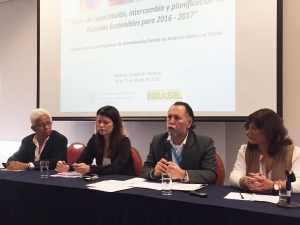Sustainable Schools: Initiative to improve nutrition for girls and boys
With the support of FAO and the government of Brasil, thirteen countries in Latin America and the Caribbean are carrying out the initiative of Sustainable Schools.

Panama City, March 14, 2016- “School Feeding Programs are an important intervention for social protection and the effective implementation of the right to adequate food. They are also key components to ensuring access to food and for food and nutritional education,” stated Tito Diaz, Coordinator of the Subregional Office for FAO-Mesoamerica.
During the last four years (2012-2015), the experience of Sustainable Schools has been implemented in eight countries in the region with the participation of 55,202 children in 226 schools. For the year 2016, five more countries of the Caribbean have joined the initiative: Belize, Guyana, Saint Vincent and the Grenadines, Granada and Jamaica, for a total of 13 countries receiving support.
Panama, through the Ministry of Education, has expressed interest in boosting an initiative which promotes improved educational achievements as well as a nutritious and balanced diet for Panamanian students.
The Subregional Coordinator for FAO- Mesoamerica also emphasized the impact that school feeding has had in recent years on the agenda of the region, such as the case of the Plan FNS CELAC 2015; which considers expanding school feeding programs and giving priority to all forms of malnutrition, from undernourishment to obesity, as a fundamental strategy.
The progress achieved and the proposals for new strategies for the countries participating in this experience were presented by FAO and the Government of Brazil, during the Conference "School Feeding Programs in Latin America and the Caribbean- The Experience of Sustainable Schools,” held in Panama.
The Sustainable Schools initiative is carried out by the project Strengthening School Feeding Programs in Latin America and the Caribbean, with the objective of establishing a reference for the implementation of sustainable school feeding programs, especially based on activities such as the involvement of the educational community; the adoption of adequate and healthy school meals; the implementation of educational school gardens; the improvement of kitchens, dining areas, storage, and the direct purchase of products from local family farming for school meals.
Participating countries in the Sustainable Schools
|
Group |
Designation |
Countries |
|
Group A - Sustainable Schools Implemented |
Expansion phase |
Honduras, Costa Rica, Dominican Republic, Guatemala, Paraguay, El Salvador. |
|
Group B - Sustainable Schools in process of implementation |
Implementation Phase |
Saint Lucia, Peru. |
|
Group C – Sustainable Schools |
Initial Phase |
Jamaica, Granada, Guyana, Saint Vincent, Belize.
|
Some lessons learned with the experience of Sustainable Schools:
- The strategies for overcoming poverty should start with territorial development, with the involvement of the local community.
- School feeding as a catalyst for local, dynamic policies and collaborative actions has boosted territorial organization.
- The policies of food and nutritional security have been promoted through discussions concerning the programs of school feeding, given its scope and systematic nature.
- The organization of local committees is essential for the development of any policy, including school feeding.
- The sustainability of social policies is linked to the joint administration by the various government actors.
- The development of pilot projects, jointly with the government and taking into account the local reality, leads to a replication of models and an expansion of the policy at the local and national levels.
- The offer of local food products in school feeding has been quite useful as a gradual learning process for the various stakeholders involved in the process of direct purchases of products from family farming.
- Food and nutritional education is a path to facing the indicators of obesity and malnutrition, which have boosted policies in various areas, especially in health and social development.
